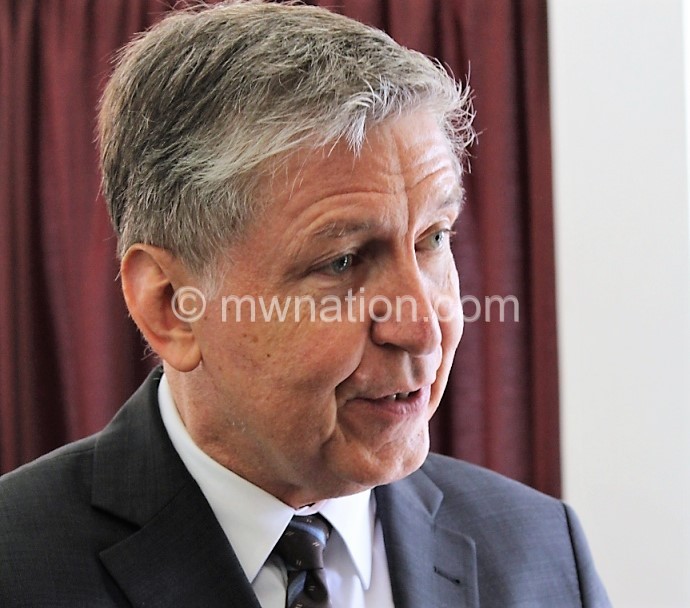‘Punish, drive out corruption’
In this interview with the new German Ambassador to Malawi Jurgen Borsch, our News Analyst REBECCA CHIMJEKA gets some insights on Germany’s support towards fighting corruption and the new envoy’s priorities in the country. Excerpts:
What are your priorities in your role as the German Ambassador to Malawi?

Germany has been a longstanding partner of Malawi, right from its first day of independence. In our close relationship, we have proven to be a reliable and consistent partner. The main focus of my work here is to further develop our friendship and to accompany and support the people of Malawi on a path to a sound, fair, prosperous and sustainable development, following the goals of the Agenda 2030.
Malawi is a valued equitable partner in our international engagement. In many areas and on a global scale, we have to embrace the same challenges in different form of appearance: climate change, energy supply, management of resources such as water, sustainability are some of the keywords. Based on the principles of trust and mutual respect, I wish to share best practice and develop synergies with the government of Malawi in its effort to manage the current challenges to the country and its population.
Germany has been particularly assertive on ensuring that a decisive action is taken on the K577 billion Cashgate scandal (which has now been reduced to K236 billion). Do you have any plans to continue with the call for justice on this?
I highly welcome the continued commitment by President Arthur Peter Mutharika, to rooting out corruption in Malawi without fear or favour. Germany, as other development partners, stands ready to support the Malawian authorities to expose, punish and drive out corruption wherever it occurs.
The forensic audit shows that failures in the system, and collusion, corruption and theft have been going on for a long time across multiple administrations. This underscores the need to have more robust systems in place and action against those involved. The audit work has especially identified the integrity of procurement processes as a key concern that should be addressed.
The Auditor General handed 13 files involving firms that the Anti-Corruption Bureau is supposed to act on. Are you happy with the progress on the matter? What would you like to see happen on the issue? Is your government funding/ ready to fund the next phase of the investigations/audit on this matter?
The auditors have prepared 13 case files to provide forensic evidence for prosecution. But a large number of additional cases merit further investigation. Since we are not involved in the investigation, I am not in a position to comment on ongoing procedures. In my view, it is very critical that the law enforcement agencies pursue their investigations with the necessary sense of urgency to bring to justice those who have defrauded the Malawian people. Nobody should be above the law.
As development partners, our role is not in investigations, but our main aim is to support Malawi in its efforts to improve public financial and economic management in order to ensure that both Malawian and foreign taxpayers money is spent to the maximum benefit of the people of Malawi.
Is the German Government happy with the Public Finance Management Reforms the Malawi Government has been implementing so far? If not what would you like to see happen?
Germany shares the IMF’s recent assessment that, while some progress has been made, improvements in the public financial management in Malawi need further and sustained efforts.
We now hope to see a swift implementation of the Government’s Public Financial Management Reform Plan, and we stand ready to continue to support the Government in this implementation. The audit especially identified accounting, procurement and contracting practices as key areas for concern where urgent reforms are needed to ensure transparent, efficient and prudent use of public finances in Malawi.
Furthermore, the independence of the Anti Corruption Bureau as well as of the Auditor General, who led the process of the forensic audit, remain critical issues for further improving integrity in the management of public finances.
Your government has not provided direct budgetary support to Malawi since 2008/9? Does Germany have any plans to resume direct budget support to Malawi and if not why?
We currently do not have any plans to resume budget support. There are several modalities available for the implementation of bilateral development programmes and Germany always seeks to apply the most effective mix of instruments in order to ensure maximum impact to the benefit of the people of Malawi. Budget support was part of the mix of modalities of bilateral cooperation between Malawi and Germany between 2010 and 2013. General budget support has remained an exceptional instrument for the provision of aid to a decreasing number of “high-performing” countries which can guarantee a low fiduciary risk and which continuously deliver development results against jointly agreed goals and targets.
How would you ensure that the resources that the German Government gives Malawi are used for its intended purpose?
As I said, we wish to ensure maximum impact to the benefit of the people. That is our first priority. In a context where systems are weak and corruption is widespread, we need to do things differently. Against this backdrop, we always keep looking for the most effective mix of instruments. All of our projects are monitored and evaluated on a permanent basis. With this approach, we continue to use and support Malawi’s country systems to the maximum extent possible. We want to be sure to align our support according to the Malawian governments’ development priorities, goals, strategies and indicators. However, we provide our support in a way which allows us to directly control the flow of our funds.





